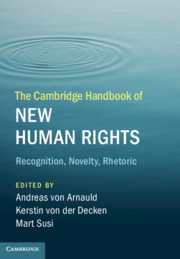Book contents
- The Cambridge Handbook of New Human Rights
- The Cambridge Handbook of New Human Rights
- Copyright page
- Contents
- Figures
- Contributors
- Acknowledgements
- Introduction
- Part I Cross-Cutting Observations
- Part II Public Good Rights
- The Right to Water
- Rights to Housing and to Land
- 6 The Human Right to Adequate Housing and the New Human Right to Land
- 7 The Human Right to Land
- The Right to Health
- The Right to a Clean Environment and Rights of the Environment
- Part III Status Rights
- Part IV New Technology Rights
- Part V Autonomy and Integrity Rights
- Part VI Governance Rights
- Index
7 - The Human Right to Land
‘New Right’ or ‘Old Wine in a New Bottle’?
from Rights to Housing and to Land
Published online by Cambridge University Press: 04 January 2020
- The Cambridge Handbook of New Human Rights
- The Cambridge Handbook of New Human Rights
- Copyright page
- Contents
- Figures
- Contributors
- Acknowledgements
- Introduction
- Part I Cross-Cutting Observations
- Part II Public Good Rights
- The Right to Water
- Rights to Housing and to Land
- 6 The Human Right to Adequate Housing and the New Human Right to Land
- 7 The Human Right to Land
- The Right to Health
- The Right to a Clean Environment and Rights of the Environment
- Part III Status Rights
- Part IV New Technology Rights
- Part V Autonomy and Integrity Rights
- Part VI Governance Rights
- Index
Summary
This commentary is written in support of the advocacy for a new human right to land put forward by Miloon Kothari. As highlighted by Kothari, access to land and natural resources is a fundamental issue for many people across the globe and should be included in international human rights law. With increased change to the planet’s climate, increasing investment in agribusiness, high demands for food and increasing populations, the demand for land is reaching breaking point. On top of these factors, the dominant market economy increasingly sees land as an important portfolio for investment, leading to what has been labelled ‘land grabbing’ across the globe. All these factors are analysed widely in the literature. What this commentary wishes to do is to ask whether the human right to land is ‘new’ or whether it is only the reinterpretation of other existing rights. To do so it will focus on three main questions. Why was the right to land not included as a stand-alone human rights norm (Section 7.2)? Should the human right to land become a stand-alone right or continue to be expressed via the realisation of other human rights such as housing and food (Section 7.3)? Should it be labelled as a ‘human right to land’ or as ‘land rights’ (Section 7.4)?
- Type
- Chapter
- Information
- The Cambridge Handbook of New Human RightsRecognition, Novelty, Rhetoric, pp. 97 - 104Publisher: Cambridge University PressPrint publication year: 2020

